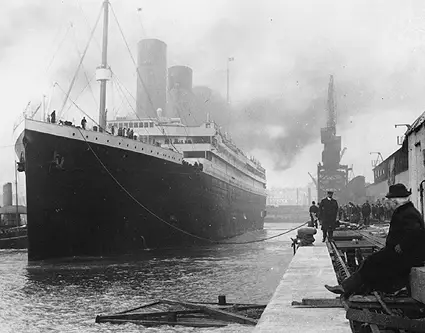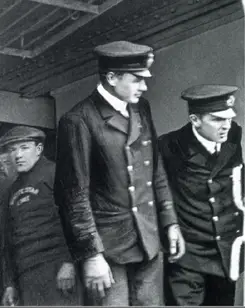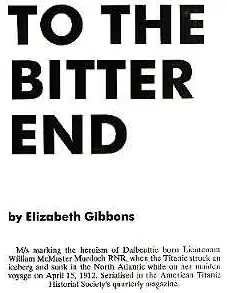13. Departure and Letters
The bulk of Titanic's crew was taken aboard on or just before sailing day; although men were eager, sometimes desperate, for work, particularly in view of the coal strike, there is an interesting comment on the company's running labor trouble in Murdoch's April 8th letter:
The holidays are on down here & it takes me all my time to get men to work even at overtime rates, but we are nearly ready for the road.
The White Star Line deemed Titanic ready for the road promptly at noon on April 10, 1912, as specified. On that day, those about to become the most famous passenger list of the century began to embark, and all those comprising the ship's company signed the Articles. Captain Smith's signature occurs first, and third on the list is that of W. M. Murdoch; the clerky hand filing in particulars is the same for all, and here occurs the most subtle indication of the haste involved. Murdoch's age is incorrect. Either the clerk or Murdoch or both were too busy to notice the error, and far too busy to correct it.

Titanic departing Southampton docks.
(Click image to enlarge)
Ada Murdoch may have been on the dock to watch Titanic leave, but not necessarily. Company regulations forbade relatives on board on sailing day, and Murdoch's last reference to his wife is ambiguous; in a letter to his parents, dated April 11, 1912, and posted at Queenstown, he wrote: "I left Ada quite well yesterday morning". Ada had been on board (someone was showing her around on April 8, 1912, while her husband was in his cabin writing to Margaret) but whether she wished to see the first departure of a ship she had not wanted her husband to join is unknown.
The letter to Captain and Mrs. Samuel Murdoch from "near Queenstown" contains William's laconic description of what happened as Titanic was eased from her berth and began gliding toward the Solent:
As we were leaving Southampton & passing the Oceanic & New York which were moored alongside each other, they ranged so much that the New York broke adrift & it was only very narrowly that we escaped doing both she & ourselves serious damage, however we did not touch her & I don't think either the New York or Oceanic had any damage at all.
Nothing more. The problem again was the combination of size and speed no indication that Captain Smith or the pilot or Murdoch had registered any lesson from the Olympic Hawke incident. The displacement from Titanic's passage had placed too great a strain on the steel hawsers holding the other two liners, with the result that the New York swung free and nearly collided with the Titanic, delaying the later's departure by an hour while tugs pulled the New York to a new berth.
Titanic then continued on to Cherbourg, and from thence to Queenstown, and here Murdoch sent his letter to his parents ashore with the tender. In it he commented on her progress:
We are getting things pretty straight now, but owing to the coal strike we are only going out at 19 or 20 knots per hour.
The ship would gradually be worked up to 21 or 22 knots by late Sunday, April 14th, 1912. Titanic's great wing propellers were turning between 75 and 78 revolutions on Sunday night; Lightoller would state to the Senate that there had been hopeful speculation that Titanic's service speed might reach 24 knots. A speed trial was scheduled for the morning of April 15, 1912. Whatever the cause of this development, there is one certainty: Murdoch's reference to Titanic's initial 19 or 20 knots makes it clear the lower speed was not a voluntary choice. No one was averse to the unexpected gift from the engine room.
Murdoch's letter has an intriguing feature; the words "My Dear" prefacing "Father & Mother" are in the left margin, as if, having concluded, he had had a sudden impulse to insert an additional term of affection. His manner throughout is formal. Murdoch indulged the national proclivity for bestowing nicknames (the lovely Ada was "Aid" to his sister Margaret), but reverted to the utmost propriety when addressing his parents.

Lightoller and Murdoch (right) prepare to
close the gangway before departure from
Queenstown, Ireland, April 11th, 1912.
It is the last photograph of Murdoch or
any Titanic officer ever seen on duty.
(Click image to enlarge)
Titanic departed Queenstown, rounding Ireland, out into the North Atlantic, gliding ever faster westward on the route to New York. She steamed steadily out into the sailor's world of danger and unpredictability, imperiled by man as well as nature. Hazards other than storms and icebergs that ships might encounter included fire her own problem, at the moment explosion, freak waves, even outbreaks of plague or cholera and the occasional mutiny. A quiet mid ocean murder on the bridge was not unknown, either. The most likely disaster was hitting another ship; the New York Times alone reported 210 such accidents between January of 1899 and April of 1912. In such incidents, at least one ship usually sank, generally with horrendous loss of life, even if the other ship stood by to render aid, and even if both were well within sight of shore.
The famous steamer tracks, eastbound and westbound, Northern and Southern, laid down for safety and to which steamship lines in the spring of 1899 had sworn to adhere, were, in fact, impossible of enforcement: it was assumed, mostly correctly, that everyone cheated, and went as far north to save time and fuel as a captain thought expedient. The career of the City of Rome is instructive: on June 8, 1899, she was reported traveling east in the westbound track, and on June 27, 1899, while steaming west in the eastbound track, she collided with the Monmouth, which was adhering to the new rules. On September 5, 1899, the City of Rome struck an iceberg, sustaining little damage; on June 24, 1905, she hit the Linden, in the St. Claire River, and, no doubt to everyone's relief, sank. (So did the Linden.) Among the fearful things an Officer of the Watch might reasonably expect to see where least wanted was another ship, eastward bound in the westbound lanes, looming bow on. Murdoch, of course, had had just this experience on the Arabic.
